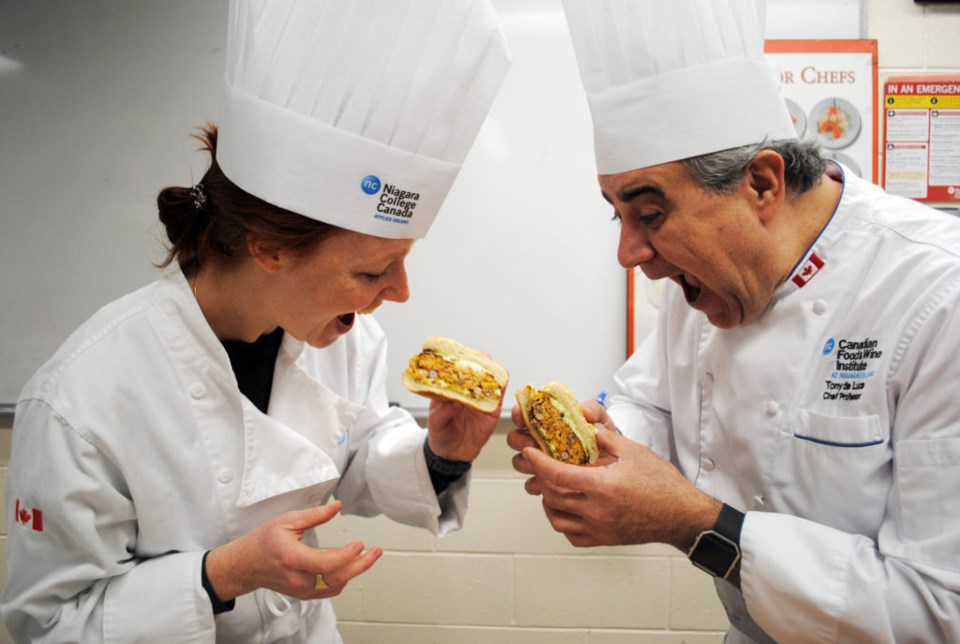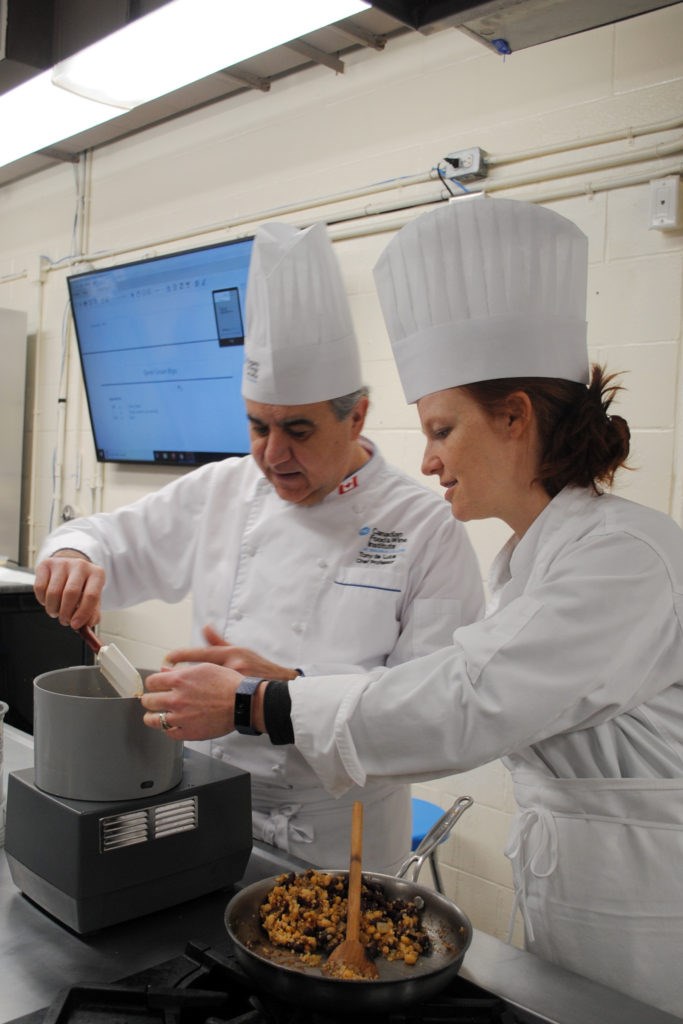
Feature writer Lauren O’Malley thought it would be fun to put a professional chef and a home chef together in a kitchen with a recipe to work on, and see what happened. Chef Tony de Luca agreed, as did Coun. Clare Cameron. We hope you agree it was fun for all — so much so we may do it again.
A great many chefs in Niagara would be within six degrees or fewer of Chef Tony de Luca. The Italian transplant has owned, managed, consulted with, and worked in myriad restaurants in the region, has written cookbooks, and teaches in the culinary program at Niagara College. He also lives in Niagara-on-the-Lake.
Councillor and deputy lord mayor Clare Cameron is a confident home chef, but has found she can get into cooking ruts. “We were kind of on a typical roster, a bit by rote,” says the mother of two young children. “Chilis, curries, a lot of barbecuing in the summer.” She explains the busy family recently signed up for a delivery service that provides recipes and ingredients for home-made meals, “and that has introduced us to a variety of new foods. The first step is mise en place, which is something I’m now transferring to everything I do in the kitchen: I prepare and measure all of the ingredients before I start making anything,” says the calm and organized Cameron.
“I’m very impressed,” says de Luca. “The very nature of mise en place is to create organization and make the process flow smoothly.”
In the summers, de Luca works at the restaurant in the Fitzpatrick Family Vineyards in scenic Peachland, B.C. He has found the demand for vegetarian, vegan, and raw food growing, so he has decided to test a recipe for a vegetarian burger with Cameron.
Unfortunately for de Luca, Cameron is not a fan of the alt-burger. “I’m not a picky eater,” she says, “but one thing I really don’t like is veggie burgers.” She goes on to say if she had to choose a last meal for herself, it would be roast beef with Yorkshire pudding.
“I feel defeated already,” says de Luca theatrically.
“We can only go up from here,” says Cameron, as both of them laugh comfortably.
Suited in chef whites and working on de Luca’s turf in a Niagara College food lab, Cameron exudes confidence and curiosity. The banter is playful and candid, and moves easily between politics and cuisine. With a broad grin the deputy mayor says, “This is exciting.”
“I don’t think I voted for you, because I’ve never heard of you,” says de Luca, laughing. Cameron takes this in stride as she dices onions with sterling knife skills gleaned from her father. “He was an Anglican minister, and would hold huge fundraising dinners, cooking the whole thing with help from his parishioners,” she explains. Her grandmother taught her father how to cook, says Cameron, and also how to appreciate food. “Making food, socializing around food, and having real food. Making food from scratch. Dad set the bar really high,” she says.
Fast friends, they discuss terminology and texture. De Luca asks, “Is it a burger if there’s no meat in it?” Cameron suggests calling it a “stack,” de Luca refers to a “symphony,” and also to “the food formerly known as a burger.” In terms of texture, de Luca is focused on the crunch and char of the outer edges of the patty, while Cameron mentions the “springiness and pull” of a hamburger.
This is the morning after a marathon council meeting, chaired by Cameron, and now she’s considering the inclusion of lemon zest in the recipe with the same depth of concern as she would any bylaw. All ingredients are discussed and considered by both parties, with de Luca showing surprise and respect for Cameron’s creativity.
At one point the non-chef suggests sprinkling crushed hazelnuts on the top of the plated patty, imitates a diner looking at the meal and says with dramatic surprise, “Wow, nuts — I didn’t expect that.”
As the pair works on the recipe, testing and amending it, other teachers from the college’s culinary program wander through the large and fully-appointed kitchen and lab. One stops in amazement seeing de Luca making a veggie burger and says in shock, “Tony’s never made a vegetarian meal in his life.” De Luca retorts, “What do you mean? I fully enjoyed that vegetable you brought back from Newfoundland. What was it called? ‘Gin?’” The two men guffaw, and discuss the distilled seaweed they recently shared.
As groovy “chill lounge” music plays, Cameron describes the quinoa de Luca has precooked as being “very relaxed.”
The main ingredients — caramelized onions, garlic oil, quinoa, romano beans, sweet potato, and seasoning — have been prepared and assembled, and de Luca says, “We have to commit: Let’s make a burger.” Binding agents are discussed, and a small toss in seasoned flour is accomplished. The patty goes into the pan, managed by Cameron.
De Luca whips up an avocado mayonnaise — which they have decided to use as a kind of drizzle, overriding Cameron’s suggestion of a lemon tahini version — while explaining he specifically likes to teach first year courses because the students are green and open-minded. Cameron is a perfect example of that, asking many questions about the culinary courses, and wondering if she can stay for de Luca’s upcoming class. She asks, “Can I come every week now?” De Luca has a suggestion. “Why don’t you teach my class today, and I’ll go and try the new beer on tap at the teaching brewery?”
“For quality control, right,” asks Cameron.
The first patty is appreciated for its flavour, but rejected for its soggy texture. The chef adds panko breadcrumbs as a binding agent to a second patty, and prepares the vehicle that will hold the burger. Cameron mocks the grocery-store, white-bread bun: “I’ve seen the bread available here — what’s with these?” De Luca insists, “They called to me while I was in the supermarket.” He uses a salamander to toast the bun, burning one half of it only to be further teased by a playful Cameron.
The politician wonders if she could come to the college kitchen and de-stress after a long council meeting. The pair talks politics and amalgamation, debating the effects — de Luca, playing devil’s advocate, supporting amalgamation. “I don’t want to get all serious,” says Cameron. “I don’t want to get all serious either,” says de Luca.
“But it is so important to be vocal. So much of democracy depends on people speaking up,” finishes the deputy lord mayor.
The burger and bun make it on to a platter, and Cameron asks about plating. De Luca, having seen many trends come and go during his culinary career, discusses negative space and composition. He mentions the out-of-date stacking that used to be de rigeur, and Cameron jokes, “We don’t do that anymore, and no more parsley garnish either.”
Creating a slim rectangle on the plate with the sandwich and its much discussed “accoutrements” of guacamole, roasted tomatoes, and thinly-sliced red onion, de Luca explains that presentation is a lot more linear now — “a linear, or a half-moon presentation is the trend.”
The diplomatic Cameron tucks garnish pieces closer together, saying, “Make them be friends.”
With a flourish, de Luca presents the “sweet potato composition formally known as a burger.” With a stern face Cameron says, “We have formed a committee and a sub-committee to determine the formal name of this vegetable sandwich formerly known as a burger.”
While presented attractively, crushed hazelnuts and all, the recipe is unanimously deemed a flop. De Luca will keep working on the recipe, and, something of a convert, Cameron asks, “Will you keep me posted?”
De Luca is grateful for the preliminary run-through of his recipe. “This has been good for me to take a snapshot of what I was thinking.”“This was really fun — thank you for your time.” She hangs her head sadly and says, “Now we have to leave."
